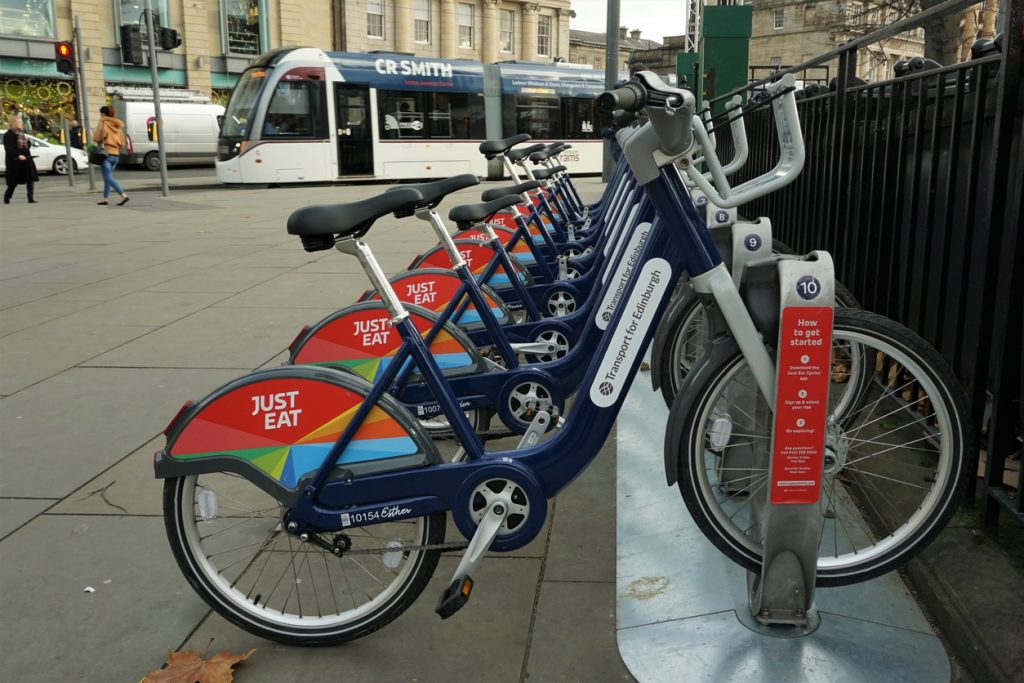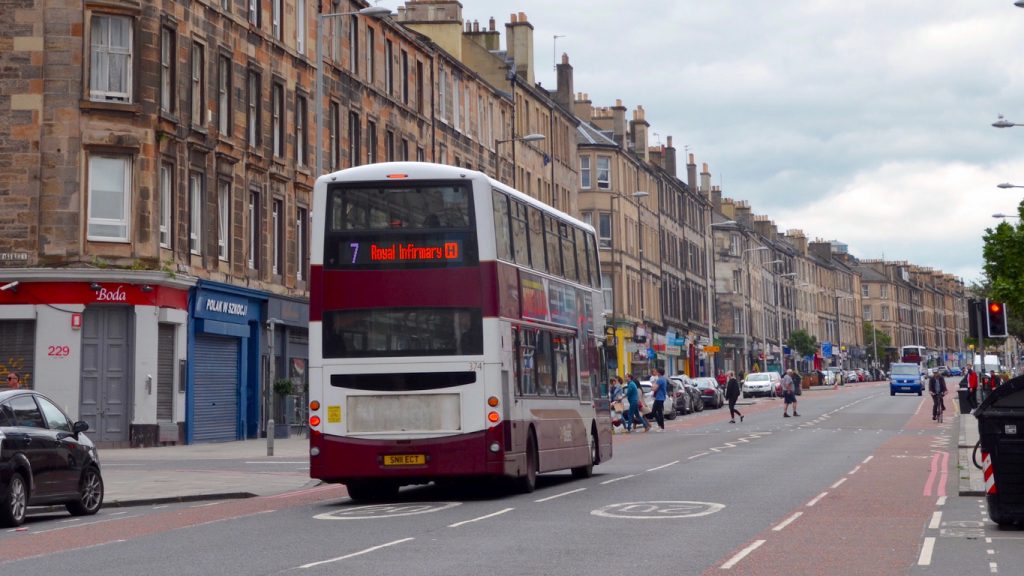Professor Campbell Gemmell and Dr Annalisa Savaresi, respectively chair and member of the steering group behind this week’s independent review into the Scottish Government’s Cleaner Air Strategy, reflect on the report’s recommendations and the extent of change necessary to make this vision a reality.

“Just Eat” sponsored hire bicycles used for Edinburgh’s public cycle system, introduced in 2018. Encouraging a culture shift from private vehicles to active travel is a central part of efforts to reduce pollution generated through travel.
This week the Scottish Government published a key milestone report, reviewing its 2015 Cleaner Air for Scotland Strategy. Authored by a multi-disciplinary and multi-partner steering group of ten experts, and supported by four working groups focussing on health, emissions, transport and planning, the report considers a raft of issues relevant to the strategy in the four years since it was launched.
The review is centred on the need to take a precautionary approach, with joined-up strategies in place across central and local government. Its vision is bold but necessary if the Scottish Government is to achieve its ambitious vision of achieving the best possible air quality for Scotland. Better collection and use of data, along with the need for detailed behavioural research, will be essential in underpinning the culture shift necessary to embed the extent of change needed.
The evidence is clear. If we are serious about improving the quality of air that we breathe, then our behaviour needs to change. This means a decisive shift away from individual cars and other inefficient, polluting transport towards a thoroughly embedded culture of sustainable and active travel. That cannot happen alone; developers, politicians and planners must consider how both current and future infrastructure developments can be reconfigured towards greener vehicles, public transport, and more walking and cycling.
By enabling everything from the daily commute and the weekly shop through to longer distance journeys to become greener, we can both protect the environment and support incremental improvements in public health, leading to enhanced in quality of life for all. Alongside considering how we travel, there will be a need also to tackle hitherto under-regulated areas, such as the ammonia emissions from agriculture, and the growing impact of domestic wood-burning stoves and gas heating.

This level of change should not be underestimated, and robust environmental regulation will be necessary to both encourage and reinforce this substantial cultural shift. Regulation should also be flexible and responsive to our evolving understanding of emissions and climate change. Every year brings new medical evidence into the relationship between particles, nitrogen oxides and heart, lung, circulatory health and even impacts on the brain. Both targets and tactics must be flexible, aligning with future recommendations from both the EU and World Health Organisation, if Scotland is to keep pace with the rest of the world.
Targets alone, however, are not enough. The culture shift necessary for this strategy to be a success requires improvements to governance, delivery and accountability – clear ownership and responsibility to achieve tangible outcomes rather than merely paying lip service to progress. Further examinations and assessments will be necessary to ensure that we stay on track.
Significant progress has been made in efforts to improve air quality. Cleaner vehicles are being phased in, along with Low Emission Zones, and our energy mix is undergoing a marked shift away from polluting combustion plants towards cleaner, greener energy. Nonetheless the more we learn, the clearer it is that even low levels of pollution can cause severe damage to health, especially for the already disadvantaged or vulnerable. This, along with issues around increasing traffic volumes, poor design of public spaces, and our continued love affair with the private car, mean that significant challenges still remain.
If we are to realise the transformation that is both necessary and desirable, action is needed now to plan for the future. Placing data and evidence at the heart of a co-ordinated effort will give Scotland the best chance of achieving cleaner air, supporting greater health and wellbeing for all.
Dr Annalisa Savaresi is Senior Lecturer in Environmental Law at the University of Stirling, and a member of the steering group that authored the independent review into the Cleaner Air for Scotland Strategy. The group was co-ordinated by Professor Campbell Gemmell, Honorary Professor in the Faculty of Natural Sciences at the University of Stirling.
